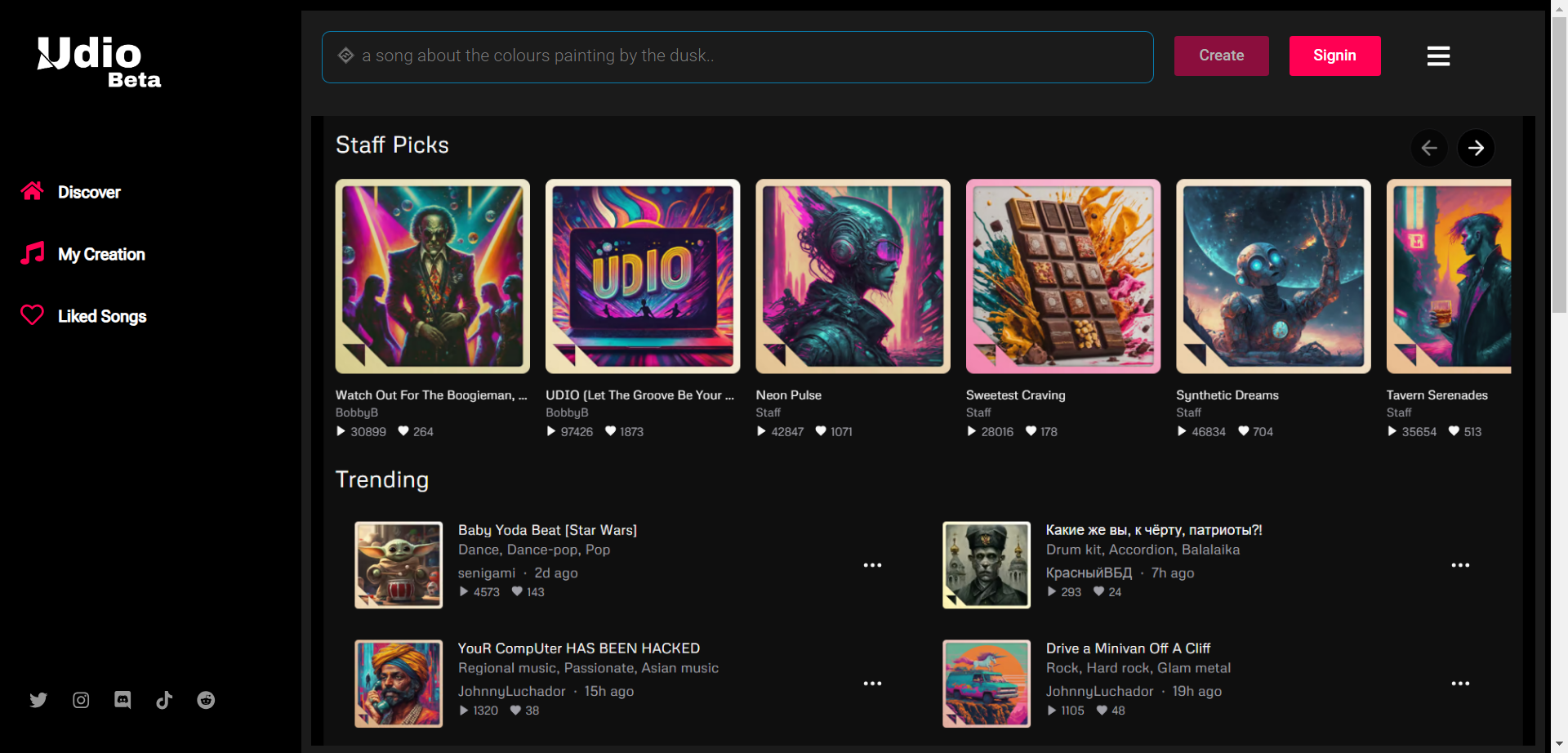About
Term of service
Privacy Policy
Guide
Free

Udio beta AI: Revolutionizing Music Composition
In the ever-evolving landscape of artificial intelligence, there emerges a groundbreaking innovation set to redefine the very essence of music creation: Udio AI. Positioned as the pinnacle of music generation technology in 2024, Udio AI stands as a beacon of possibility for aspiring composers and seasoned professionals alike.
Unveiling Udio AI
Udio AI is not just another run-of-the-mill music generator; it is a marvel of technological ingenuity. At its core, Udio AI harnesses the power of cutting-edge deep learning algorithms, meticulously trained on an extensive database of musical compositions spanning various genres and styles. This vast reservoir of musical knowledge serves as the foundation upon which Udio AI crafts its masterpieces.
Simplicity Meets Sophistication
What sets Udio AI apart is its unparalleled simplicity coupled with its ability to produce intricately detailed compositions. Through a user-friendly interface, individuals can effortlessly specify their desired musical genre, ambiance, and duration. With just a few clicks, Udio AI springs into action, orchestrating a symphony of sound that rivals the works of human composers.
The Inner Workings
Delving into the mechanics of Udio AI reveals a sophisticated interplay of neural networks and deep learning techniques. Upon receiving user input, the AI meticulously analyzes the parameters provided, drawing upon its vast repository of musical knowledge to craft original compositions. From nuanced chord progressions to evocative lyrics, Udio AI leaves no stone unturned in its quest to create captivating musical experiences.
Limitless Potential
While Udio AI excels in the realm of music generation, it is essential to acknowledge its inherent limitations. The AI operates within the confines of existing musical styles, making it unlikely to birth entirely new genres. Additionally, while the quality of Udio AI’s compositions is impressive, discerning ears may detect a subtle “artificial” touch—a testament to the fine line between human creativity and artificial intelligence.
Accessibility and Affordability
One of the most remarkable aspects of Udio AI is its accessibility. Through a beta version available for testing, users can experience the magic of Udio AI firsthand, with a generous allocation of free credits. Looking ahead, rumors suggest that Udio AI will offer subscription plans at an affordable monthly rate, making it a cost-effective solution for musicians, content creators, and music enthusiasts alike.
Looking to the Future
As Udio AI continues to evolve, the possibilities are endless. From custom stylistic preferences to seamless integration with existing workflows through APIs, Udio AI is poised to revolutionize the landscape of music composition. Whether you’re a budding artist seeking inspiration or a seasoned professional looking to streamline your creative process, Udio AI offers a gateway to a world of limitless musical expression.
In conclusion, Udio AI stands as a testament to the transformative power of artificial intelligence in the realm of music composition. With its unparalleled blend of innovation, accessibility, and affordability, Udio AI is not just the best AI music generator of 2024—it’s a harbinger of a new era in musical creativity.
Frequently Asked Questions (FAQ)
1. What is Udio AI?
Udio AI is an advanced artificial intelligence designed to generate high-quality music compositions across various genres and styles. Leveraging deep learning algorithms, Udio AI analyzes user input to create original songs with lyrics, melody, and accompaniments.
2. How does Udio AI work?
Udio AI utilizes neural networks and deep learning techniques trained on a vast database of musical compositions. When prompted by user instructions specifying genre, ambiance, and duration, the AI intelligently combines musical elements to compose unique tracks.
3. What genres and styles of music does Udio AI support?
Udio AI supports a wide range of musical genres, including rock, pop, hip hop, classical, and more. Users can specify their preferred style, allowing the AI to tailor compositions to their musical tastes.
4. Can I customize the songs generated by Udio AI?
Yes, Udio AI offers advanced customization options, allowing users to tailor compositions to their preferences. From adjusting musical parameters to specifying lyrical themes, users have the flexibility to create personalized tracks.
5. Are the songs generated by Udio AI royalty-free?
While users can access a beta version of Udio AI for free with a limited number of credits, commercial usage may require subscription plans. Users should review the terms of use to understand licensing and copyright implications.
6. Can I use Udio AI-generated songs on platforms like YouTube or Spotify?
Usage rights for Udio AI-generated songs may vary based on subscription plans and licensing agreements. Users should consult the terms of use to determine whether commercial usage requires additional permissions or fees.
7. Does Udio AI replicate the voices of known singers?
No, Udio AI generates original but fictional sung voices tailored to the composition. While the AI can create realistic vocal performances, it does not replicate specific singers’ voices.
8. What are the limitations of Udio AI?
While Udio AI excels at generating music within established genres, it may not invent entirely new musical styles. Additionally, discerning listeners may notice subtle differences between AI-generated tracks and those composed by human artists.
9. Is Udio AI suitable for professional musicians?
Udio AI caters to a wide range of users, from beginners to professionals. While it offers intuitive tools for novice composers, professionals may appreciate its advanced customization options and time-saving features.
10. What does the future hold for Udio AI?
As Udio AI continues to evolve, it aims to expand its capabilities further, potentially offering features such as custom stylistic preferences and integration with third-party platforms through APIs. Users can expect ongoing improvements and enhancements to enrich their music composition experience.